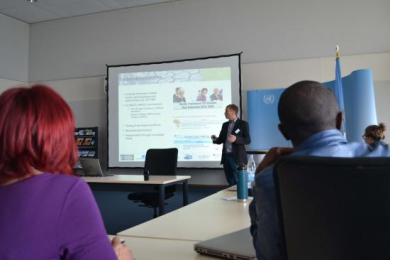The project on Earth Observation Based Information Products for Drought Risk Reduction at the National Level (EvIDENz) conducted a workshop from 21 to 22 September at the United Nations Campus in Bonn to present its mid-term results. The event brought together project partners, scientists, policy-makers, practitioners and representatives of governmental institutions.
During the workshop, participants discussed information, knowledge and methods related to drought risk assessment and reduction strategies using the example of case studies in South Africa and Ukraine. More specifically, they focused on:
- Assessing agricultural drought hazard and vulnerability to support the Sendai Framework for Disaster Risk Reduction 2015-2030 (Sendai Framework).
- Quantifying drought risk to support assessment of the Sendai Framework targets “people affected” and “economic loss” and related indicators.
The workshop participants, which included experts from partner organizations in the project's case study countries South Africa and Ukraine, provided important feedback, to support adjusting the workplan for the remaining duration of the project.
EvIDENz is based on the realization that international conventions and frameworks feature more and more goals, targets, priorities for actions and indicators which are quantifiable and measureable rather than being of qualitative nature. This offers new opportunities for Earth observation. The project aims at developing new methods and appropriate means of communicating Earth observation-based information so that it can be used to meet the requirements of convention/frameworks goals, targets and indicators as well as needs by national stakeholders. It concentrates on the value adding chain from sensor data to information to knowledge to informed decision making and implementation.
The project is carried out by the Centre for Remote Sensing of Land Surfaces (ZFL), University of Bonn, the United Nations University Institute for Environment and Human Security (UNU-EHS) and the United Nations Office for Outer Space Affairs (UNOOSA) through its Platform for Space-based Information for Disaster Management and Emergency Response (UN-SPIDER), together with partner organizations in South Africa and Ukraine.

